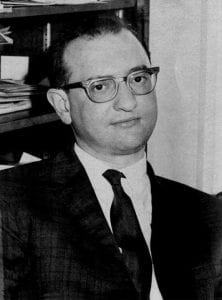
Wolf Wofensberger in 1964, when he was on the faculty of the Nebraska Psychiatric Institute (courtesy of the Wolf Wolfensberger Collection, Special Collections Department, McGoogan Library of Medicine, UNMC)
Wolf Wolfensberger was an educational psychologist, a leading figure in the mental retardation field, and Director of the Syracuse University Training Institute for Human Service Planning, Leadership and Change Agentry until his death. He was not an autism specialist, but he rose to national and international prominence in the early 1970s, when ideas about developmental disability were being reshaped by deinstitutionalization and the critiques of professionalism that emerged during the 1960s. Wolfensberger was a fierce enemy of residential institutions who embraced the term “change agent.” His central contribution, the concept of normalization, was influential among human service reformers and professionals, who considered him a model of passionate, principled commitment. Normalization was considered a revolutionary idea that would transform the lives of people with developmental disabilities.

Wolf Wolfensberger as a boy in Germany at the end of World War II (courtesy of the Wolf Wolfensberger Collection, Special Collections Department, McGoogan Library of Medicine, UNMC)
Wolfensberger’s childhood, education, and religious faith all informed his approach. He grew up in Nazi Germany in a family that included both Catholics and Jews. He immigrated to the United States in 1950 at the age of sixteen. After attending Sienna College and St. Louis University, he earned a PhD at Peabody College (now Vanderbilt University’s School of Education), which established the country’s first doctoral program specializing in mental retardation. Wolfensberger studied with Lloyd Dunn, whose skepticism about segregated special education made a deep impression. Gunnar Dybwad, perhaps the best-known national reformer in the field, was another influential mentor.
Wolfensberger’s early career exposed him to a wide variety of institutional and agency settings: Muscatatuck State School in Indiana, E.R. Johnstone Training Center in New Jersey, Plymouth State Home and Training School in Michigan, and the Nebraska Psychiatric Institute. As a result of deinstitutionalization, many of these institutions were emptied and then demolished in the decades after Wolfensberger moved through them. In 1973, Wolfensberger moved into a full-time academic position at Syracuse University.
Between 1971 and 1973, Wolfensberger was a visiting scholar at the National Institute on Mental Retardation in Toronto, and it was there that he systematically elaborated the principle of normalization, also the title of his best-known book, published in 1972. Normalization championed one simple goal: making the lives of people with developmental disabilities resemble the lives of their non-disabled counterparts by thoroughly integrating them into all social institutions, from work and school to family and community.
The origins of normalization were Scandinavian. Policy-makers like Niels Erik Bank-Mikkelsen, who headed the Danish National Service for the Mentally Retarded in the 1950s, and Bengt Nirje, Executive Director of the Swedish Association for Retarded Children, were early champions of normalization. Advocates and scholars in the U.S. found inspiration in Scandinavian law and social policy. The essence of normalization, according to Nirje, was “making available to the mentally retarded patterns and conditions of everyday life which are as close as possible to the norms and patterns of the mainstream of the society.”
Normalization informed the direction of disability rights activism and policies to promote inclusion and mainstreaming during the 1970s. Later on, Wolfensberger became known as a contrarian willing to take controversial positions on touchy subjects. He was an opponent of abortion and all forms of what he called “death-making,” which represented a continuum of dehumanization stretching from withholding medical treatment from severely disabled newborns to assisted suicide and the broad use of psychoactive drugs. During his years in Syracuse, Wolfensberger and his wife Nancy were active participants the city’s Unity Kitchen, a Catholic Worker initiative, and he helped found the Syracuse l’Arche community, a housing experiment which embodied the practice of normalization. In l’Arche, non-disabled people chose to live side-by-side with community members with intellectual disabilities.
Wolfensberger’s defense of “life-sharing” rather than “death-making” was surely rooted in his religious faith. But he also despised euphemisms and spoke out forcefully when he believed harmful policies were being disguised as humanitarian victories. Wolfensberger disdained the “people-first” language favored by many disability rights activists who shared his commitment to normalization, for instance. Replacing old words with new ones was, for Wolfensberger, a form of ridiculous political correctness. Changing the descriptors people used—substituting developmentally disabled for mentally retarded—would not alter negative attitudes and did nothing to make a tangible difference in people’s lives. He went so far as to call it “language terrorism.”
As blunt as he was brilliant, Wolf Wolfensberger was the architect of normalization. This approach sought to achieve dignity and equality by establishing as much similarity as possible between the lives of disabled and non-disabled citizens. His career brought important social and institutional reforms in the organization of human services together with legal and political developments related to civil and human rights after World War II. The result was real momentum toward community-based services, integration, and mainstreaming for developmentally disabled people, as well as wider horizons of access, opportunity, and equality for all Americans.